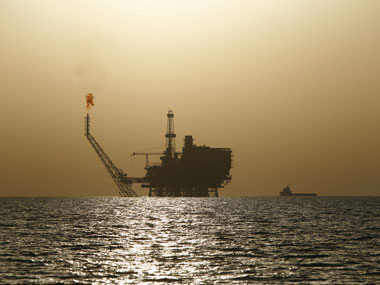Oil and Natural Gas Corp (ONGC) may not get much compensation even if it is established that natural gas from its idling fields in Bay of Bengal had migrated to adjoining KG-D6 block of Reliance Industries (RIL) as the contract does not provide for retrospective penalty for such acts. ONGC had in 2013 claimed that RIL had deliberately drilled wells close to the boundary that its Krishna Godavari basin KG-DWN-98/3 (KG-D6) block shares with the state-owned firm’s KG-DWN 98/2 block and Godavari Block (G-4). It claimed that some of its gas may have been pumped out from the adjoining block. [caption id=“attachment_2465866” align=“alignleft” width=“380”] Representational image. Reuters[/caption] US-based consultant DeGolyer and MacNaughton (D&M) has been appointed by the two firms to study if the two blocks are contiguous and have a common gas reservoir from which gas can be produced from either side. HSBC Global Research in a note said the underlying contract - production sharing contract (PSC) - provides for the resolution of such a dispute. A full chapter on resolution of such a dispute through unit development has been devoted in the PSC, said the research agency, pointing out that as per the terms of the contract, if a reservoir is situated partly within a contract area belonging to a party and partly in a different contract area, any of the parties could write to the government, and the government will then ask the two contractors to collaborate and agree on a joint development of reservoir within a stipulated time period. If parties fail to agree to do so, the government can force the parties to prepare and execute such a joint plan, it said. RIL began gas production from KG-D6 block in April 2009 while ONGC is yet to begin development work on gas fields in G-4 that were discovered more than 12 years back. PSC does not provide for an explicit retrospective penalty on any of the parties that produced from its approved contract area (mining lease area) as per an approved field development plan, if the other party to the dispute failed to seek such a unit development, HSBC said. ONGC had sought compensation for the gas belonging to it that RIL had produced. Sources said D&M has in its preliminary comments stated that the reservoir in the two neighbouring blocks are connected and there is no unconnected area in G-4. ONGC claims that 11.9 billion cubic meters (bcm) of its gas may have been produced from RIL’s KG-D6 field. This at a gas price of $4.2 per mmBtu, will be worth less than $180 million. Even this it can get only after field expenses as well as taxes and royalty paid by RIL is deducted, they said. D&M is likely to submit its report on the issue by next month. And as per Supreme Court order, the Oil Ministry will have six months from the date the report is submitted to decide if ONGC is entitled to any compensation from RIL. KG-DWN 98/2, owned by ONGC since 2003, and RIL’s KG-DWN 98/3 (better known as KG D6) were auctioned in 2000 under the New Exploration Licensing Policy (NELP). Discoveries were announced in KG-DWN 98/2 in 2001 and in KG D6 in 2002. But from there on, KG D6 went on to declare commerciality in 2003, filed its field development plan in 2004 and started commercial production in 2009, thus reducing the time between discovery and production to just six-and-a-half years from the internationally accepted time line of ten years. In the process, it also became the first domestic deep water block to produce oil and gas. It continues to remain the only producer in the extremely difficult deep waters even today though production has seen a steep fall. Not only is ONGC a few years away from production, it raised the issue of contiguity of reservoirs only in July 2013, four years after RIL started production after duly complying with all the requirements of the PSC. It is this delayed raising of the issue of contiguity that HSBC is referring to while saying that the PSC does not provide for “retrospective” compensation for withdrawal of gas from an idling block with a contiguous reservoir extending into that of a producing neighouring block. With respect to contiguity of reservoirs, the PSC is a prospective, forward-looking document that lays the ground rules to ensure the most efficient and cost-effective way of extracting natural resources. This is a clause that protects the interests of the sovereign over the rights of the individual operators. The logic here is that if a reservoir extends into two blocks owned by two different operators, it is in the nation’s interest to avoid both operators duplicating enormous infrastructure and resources to extract the same amount of gas. For example, if the capacity of a reservoir is two tcf (trillion cubic feet), that is the amount of gas that can be extracted, no more or no less, whether one operator extracts it or two. But when two operators draw from one reservoir, it will double the cost of extraction. That is why the PSC gives the government the right to force a joint development plan on the operators if the existence of contiguity is realised prospectively. There is nothing in the PSC to look at joint development retrospectively. (With inputs from PTI) (Disclosure: Firstpost is part of Network18 Media & Investment Limited which is owned by Reliance Industries Limited.)
Oil and Natural Gas Corp (ONGC) may not get much compensation even if it is established that natural gas from its idling fields in Bay of Bengal had migrated to adjoining KG-D6 block of Reliance Industries (RIL).
Advertisement
End of Article


)

)
)
)
)
)
)
)
)



